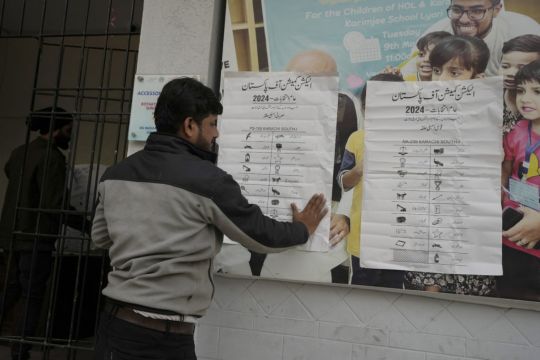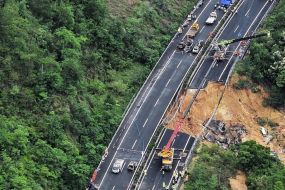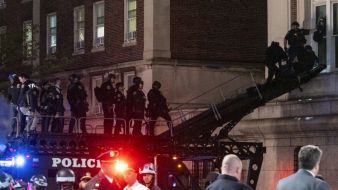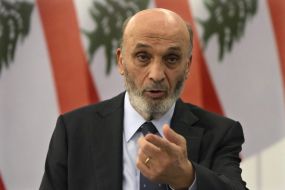Pakistanis are braving cold winter weather and sporadic violence to vote for a new parliament, a day after twin bombings claimed at least 30 lives in the worst election-related violence ahead of the balloting.
Tens of thousands of security forces were deployed at polling stations and authorities suspended mobile phone services across the country to prevent disruptions and flash protests.
Pakistan’s Interior Ministry said the decision was made to maintain law and order, and did not say when the suspension would be lifted.
There were a handful of attacks that appeared aimed at disrupting the vote.
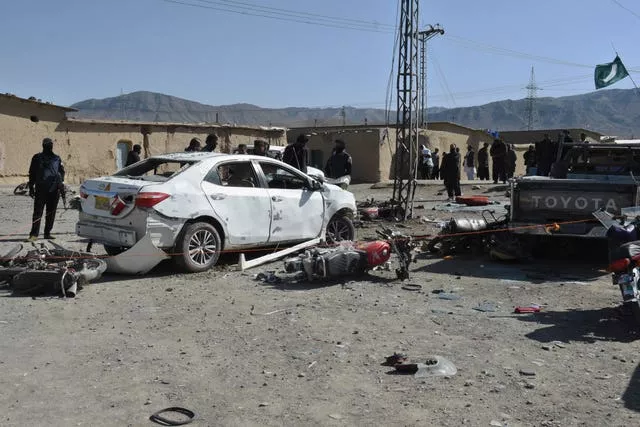
In the north-western district of Dera Ismail Khan, gunmen set off a bomb and then opened fire at a police van, killing five officers and wounding two others, local police official Khalid Khan said.
The officers were assigned to security duty during the elections.
No-one claimed responsibility for the attack but the area is a former stronghold of the Pakistani Taliban who often target police forces.
Also in the north-west, gunmen fired on troops in the town of Kot Azam, killing a soldier, police official Fiyyaz Khan said.
Again, no-one immediately claimed responsibility for that attack.
Unidentified assailants threw hand grenades at two polling stations in restive south-western Baluchistan province, where twin bombings hit separate election offices on Wednesday, killing at least 30 people and wounding more than two dozen others.
The so-called Islamic State group claimed responsibility for both bombings.
The grenades on Thursday caused panic among voters but no-one was hurt, police said.

Voters headed to the polls in heavy snowfall in the ski resort of Murree, near Islamabad, and lined up to vote in snow-covered plains in eastern Punjab province and the mountains of southern Sindh province.
The election has also been marred by allegations from the Pakistan Tehreek-e-Insaf party of imprisoned former prime minister Imran Khan that its candidates were denied a fair chance at campaigning.
The cricket star-turned-Islamist politician — ousted in a no-confidence vote in parliament in April 2022 — is behind bars and banned from running, but commands a massive following.
Pakistan’s next government will face huge challenges, from containing unrest, overcoming an intractable economic crisis to stemming illegal migration.
As many as 44 political parties are vying for a share of the 266 seats up for grabs in the National Assembly, the lower house of parliament. An additional 70 seats are reserved for women and minorities in the 336-seat house.
The new parliament will choose the country’s next prime minister and the deep political divisions make a coalition government seem more likely.
Elections are also taking place on Thursday for the nation’s four provincial assemblies.

The last time parliamentary elections were held in 2018, when Mr Khan came to power, a little more than half of the country’s electorate of some 127 million voters cast ballots.
If no single party wins a simple majority, the first-placed gets a chance to form a coalition government, relying on allies in the house.
The top contender is the Pakistan Muslim League party of three-time former prime minister Nawaz Sharif, who returned to the country last October after four years of self-imposed exile abroad to avoid serving prison sentences at home.
Within weeks of his return, his convictions were overturned, leaving him free to seek a fourth term in office.
With his arch-rival Mr Khan sidelined and in prison, Mr Sharif seems to have a pretty straight path to the premiership, backed by his younger brother, former prime minister Shehbaz Sharif, who is likely to play an important role in any cabinet led by Mr Sharif.
The Pakistan People’s Party is a strong contender, with a power base in the south, and is led by a rising star in national politics — Bilawal Bhutto-Zardari, the son of assassinated former Prime Minister Benazir Bhutto.
The Sharifs and Bhutto-Zardari are traditional rivals but have joined forces against Mr Khan in the past, and Mr Bhutto-Zardari served as foreign minister until last August, during Shehbaz Sharif’s term as premier.
Candidates from Mr Khan’s party have been forced to run as independents after the Supreme Court and Election Commission said they cannot use the party symbol — a cricket bat on voting slips — to help illiterate voters find them on the ballots.
